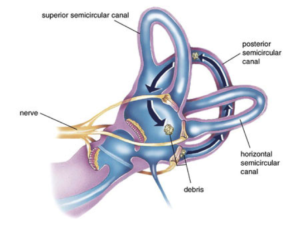Vertigo and dizziness affect the balance centers in the brain, giving you a perception of movement, when in fact you are not moving.
CLICK HERE TO ATTEND A FREE INFORMATIONAL MEETING FOR VERTIGO AND BALANCE ISSUES
The causes of vertigo and dizziness vary quite a bit from debris in the inner ear, to blood sugar dysregulation, to low blood pressure, to infection, to concussion and others.
What matters most is determining the CAUSE of the dizziness or vertigo. We do this multiple ways in our office.
- VNG testing (videonystagmography)
- Dix-Hallpike Testing of the semicircular canals
- Balance Testing
- Gait Testing
- Evaluation of the Cervical Spine
- Neurological Evaluation
Cervicogenic Vertigo
This typically occurs when the proprioception of the Cervical spine is altered, which sends information directly into the vestibular nuclei in the brainstem, giving you a feeling of disequilibrium. Patients often complain “my neck is out and it’s giving me vertigo” and our ultimate goal is to identify the CAUSE of why their neck went out.
BPPV (Benign Paroxysmal Positional Vertigo)
BPPV is a term for debris that has broken off in the ear, this debris is called an otoconia. It breaks loose from an area in the otolithic system that is connected to the inner ear or semicircular canals. This debris (which is a calcium carbonate crystal) can create feels of motion creating the feeling of spinning when the head is moved in any direction, especially when the head is moved in the direction of the canal that has debris in it, or opposite of the canal. The most common symptom of this is when patients get dizzy when lying down, rolling over in bed, or when moving quickly.
Centrally Maintained Vertigo
This type of vertigo/dizziness is much more difficult for the average practitioner to identify. Usually if it’s not one of the others listed above, this is the diagnosis most practitioners apply to the case. However, just because there is a diagnosis associated with this case, doesn’t mean that someone knows WHY that patient is having dizziness or vertigo.
Getting Clinical
In all cases mentioned above, it is imperative to receive proper testing to identify the problem and proper therapies to address the cause of the vertigo/dizziness. In any of the above cases, a VNG is very beneficial because it can uncover subtle problems that may be starting to develop, or that other practitioners have overlooked because they do not have the proper equipment to perform the testing.

